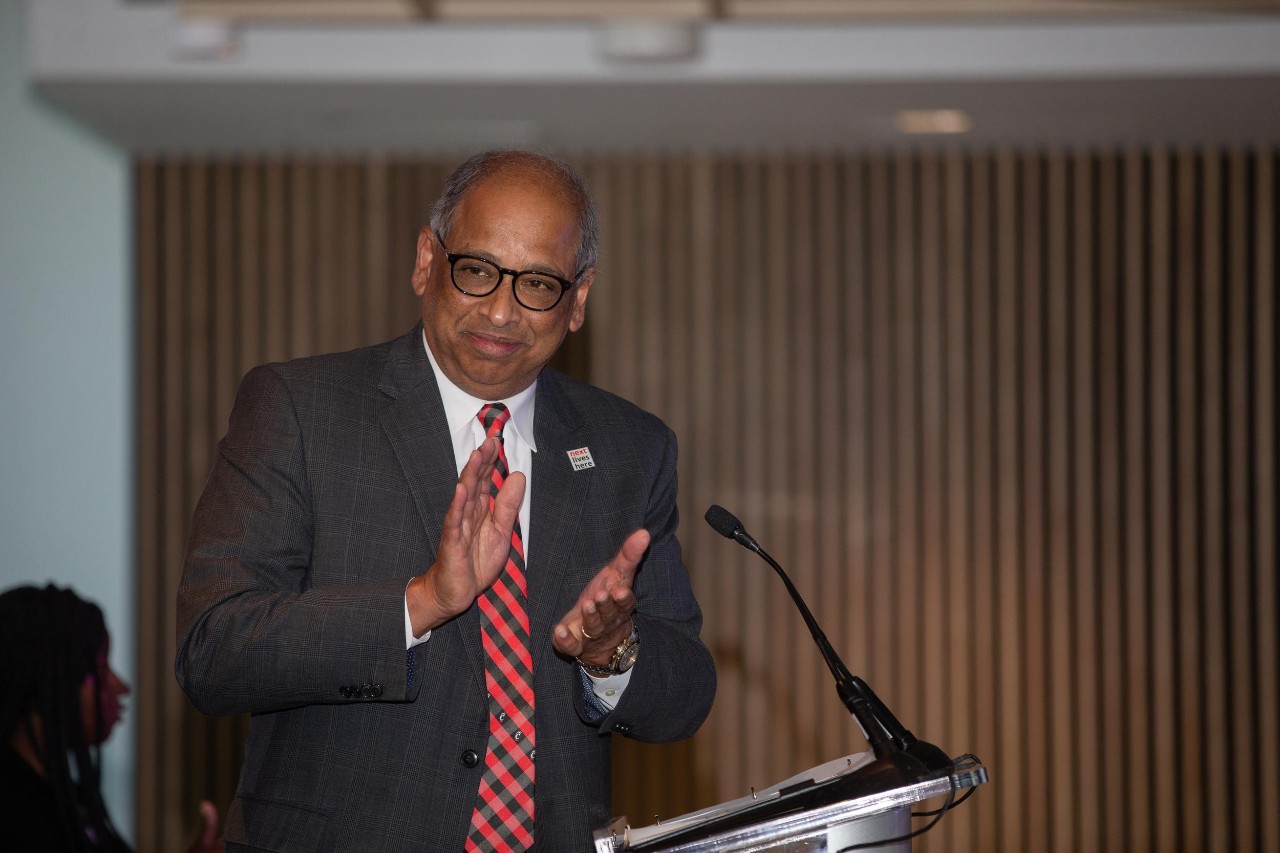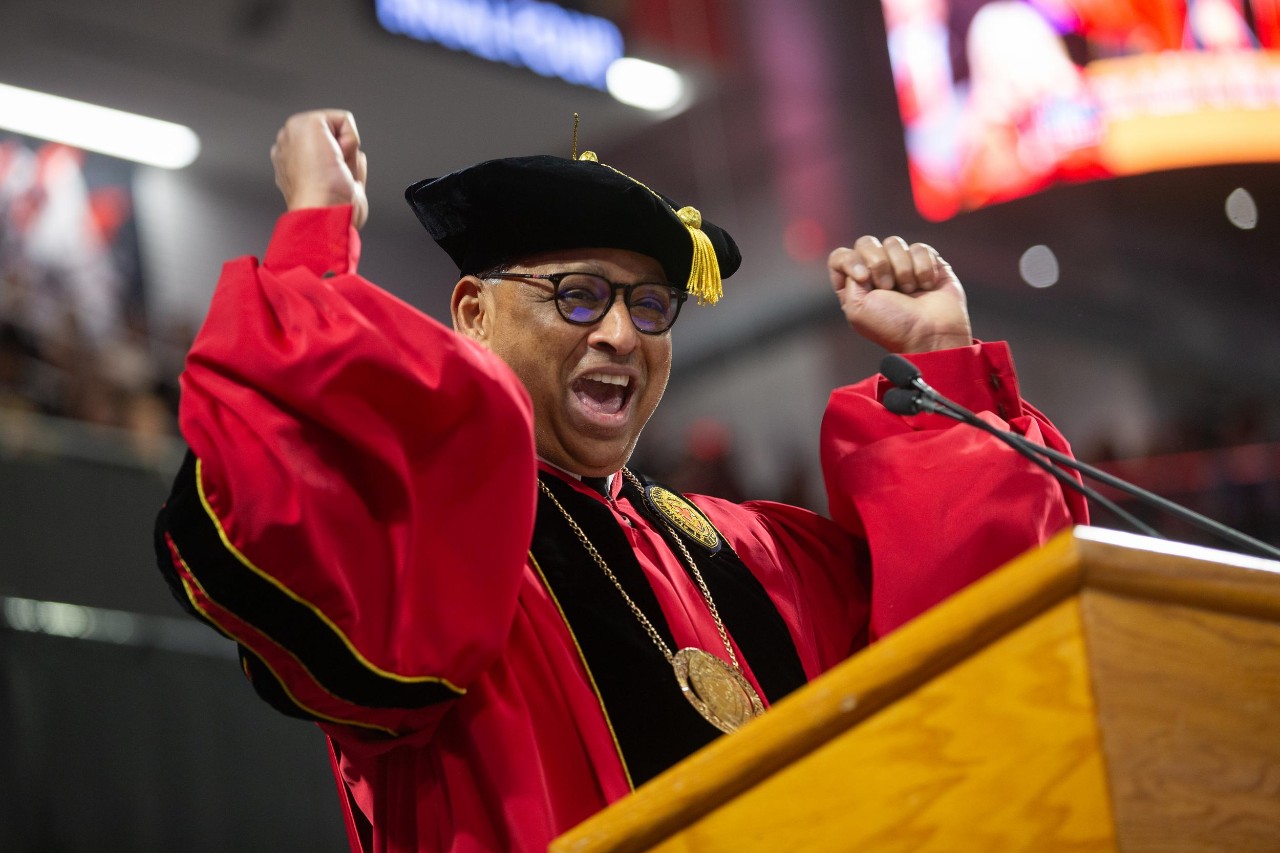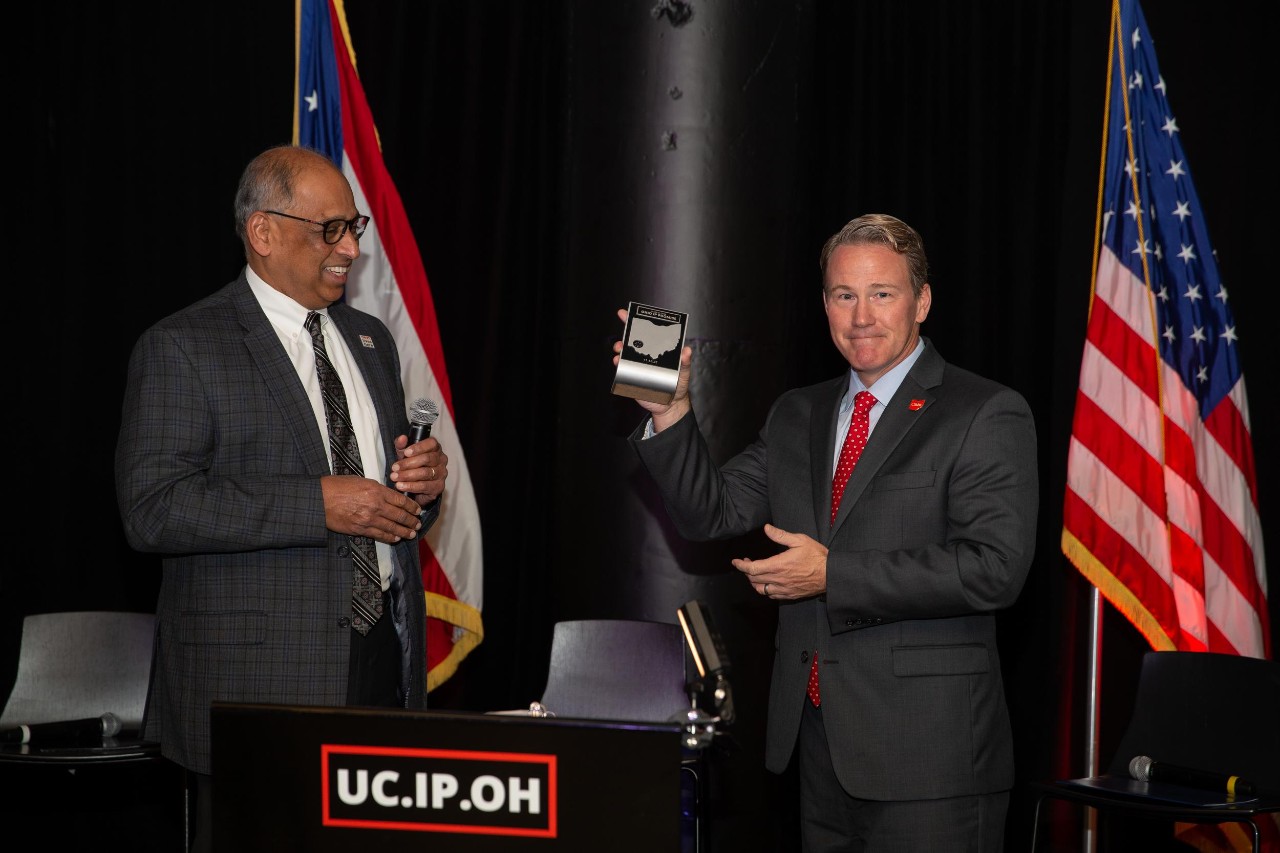President Pinto named to NAI Class of Fellows
Since its creation in 2012, the NAI Fellows program has recognized 1,898 researchers and innovators who together hold more than 63,000 United States patents and 13,000 licensed technologies. Their innovations have created more than $3 trillion in revenue and generated 1 million jobs.
“If you survey the whole of higher education, you will find that few presidents have done more to advance the essential role of creativity, invention, innovation and entrepreneurship than President Pinto,” said Ryan Hays, UC executive vice president and chief innovation and strategy officer.
University of Cincinnati President Neville G. Pinto speaks during the grand opening of the UC Digital Futures building. Photo/Andrew Higley/UC Marketing + Brand
As UC president, Pinto leads the region’s only Carnegie Research 1 university, an institution attracting more than $615 million in annual external research grants and contracts.
Pinto, who became the 30th president of UC in 2017, made innovation the cornerstone of UC’s strategic direction, Next Lives Here. He established the university’s Office of Innovation, seeded with a $10 million budget.
He also created the Next Innovation Scholars program, a cohort-based scholarship that provides students with immersive, innovation-based learning experiences that bridge the traditional divides among campus, community and industry.
Pinto established the 1819 Innovation Hub, which seeks to scale innovation and entrepreneurship across campus and within the broader community. Five Fortune 500 companies — Procter & Gamble, Kroger, Fifth Third Bank, FIS and Western & Southern Financial Group — have established innovation centers in the 1819 Innovation Hub. It’s also home to CincyTech, a venture fund whose portfolio companies have driven more than $1 billion in economic impact in the Cincinnati region.
The 1819 Innovation Hub also houses UC’s Venture Lab, which has launched more than 90 start-up companies, and the tech transfer team that has achieved record-breaking results in invention disclosures, patents filed and patents issued. The innovation model established by Pinto has created a 94% increase in patents over the five years before he arrived and a 600% increase in startups launched.
“With over 35 years of experience in higher education as a teacher, researcher, and administrator, President Pinto has ignited new levels of inventorship and entrepreneurial spirit here at the University of Cincinnati,” said Jason Heikenfeld, UC professor of biomedical, electrical and chemical engineering and an NAI Fellow.
University of Cincinnati President Neville G. Pinto delivers the fall 2023 commencement address at Fifth Third Arena. Photo/Andrew Higley/UC Marketing + Brand
Under Pinto’s leadership, UC opened the Digital Futures I building that includes more than 20 interdisciplinary research labs.
Digital Futures I and the 1819 Innovation Hub are part of the Cincinnati Innovation District along with Digital Futures II, UC Health and Cincinnati Children’s Medical Center. Launched in 2020, the CID attracted a $100 million investment from the State of Ohio and served as the blueprint for innovation districts in Columbus and Cleveland.
Based on UC’s development and licensing programs developed under Pinto, the State of Ohio created the Ohio IP Promise, which tasked all public universities statewide to adopt their own form of UC’s IP model.
In 2021, UC was recognized by the Association of Public and Land-Grant Universities (APLU) with its Innovation and Economic Prosperity Award. The APLU awarded its top prize in innovation and economic engagement to UC the following year.
“President Pinto's contributions extend beyond his roles as an inventor, educator and administrator,” said Sandra Degen, past UC vice president for research and a member of the inaugural NAI Class of Fellows. “He has been instrumental in fostering a culture of academic innovation at the University of Cincinnati, nurturing inter-institutional and government relationships that promote academic IP development and industry interaction. His efforts have significantly impacted the welfare of society, promoting economic development and improving quality of life.”
University of Cincinnati President Neville G. Pinto, left, presents a gift to Ohio Lt. Gov. Jon Husted during an Ohio IP Promise event at UC’s 1819 Innovation Hub. Photo/Andrew Higley/UC Marketing + Brand
Pinto previously was a UC faculty member whose chemical engineering laboratory attracted more than $6 million in external research funding and trained 32 graduate students including 16 PhD students.
He also holds two patents for high-capacity materials for capture of metal vapors from gas streams and liquid chromatograph on a chip.
“He has been regularly recognized for his commitment to education, earning four separate awards for his teaching,” said Andrew Steckl, distinguished research professor of engineering at UC and NAI Fellow. “His dedication to nurturing the next generation of inventors is a testament to his commitment to the advancement of knowledge and innovation.”
In addition to Pinto, UC has several faculty/emeriti who are NAI Fellows including:
- Dharma Agrawal (2012)
- Steven Boyce (2017)
- Sandra Degen (2012)
- Jason Heikenfeld (2013)
- Diane Schmidt (2016)
- Andrew Steckl (2015)
Former UC President Santa Ono was accepted as an NAI Fellow while he was at UC as well.
This year’s class of NAI Fellows includes individuals from 118 research universities, governmental and non-profit research institutions worldwide. The class holds more than 4,600 issued U.S. patents.
The 2023 class of NAI Fellows will be honored and presented their medals by a senior official of the United States Patent and Trademark Office at the NAI 13th annual meeting on June 18, 2024, in Raleigh, North Carolina.
Featured image at top: University of Cincinnati President Neville G. Pinto in front of Cincinnati skyline and Ohio River. Photo/Andrew Higley/UC Marketing + Brand
Innovation Lives Here
The University of Cincinnati is leading public urban universities into a new era of innovation and impact. Our faculty, staff and students are saving lives, changing outcomes and bending the future in our city's direction. Next Lives Here.
Latest UC News
- Tips to reduce alcohol useThe University of Cincinnati's Chris Tuell was featured in a Fox News article discussing tips on how to reduce alcohol use following the recent Surgeon General's advisory about alcohol use and cancer risk.
- Why is Facebook abandoning fact-checking?UC Professor Jeffrey Blevins talks to France TV Washington about Facebook's decision to stop fact-checking public posts and allowing community notes instead to address disinformation.
- UC inventor recognized for lifetime of innovationUC College of Engineering and Applied Science Professor Ephraim Gutmark is being honored for a lifetime of innovation by the National Academy of Inventors. For one of his latest projects, Gutmark teamed up with his physician daughter at Cincinnati Children's to help children with breathing difficulties.
- Primary care systems are under pressure, but new models could alleviate the strainPatient access is just one of a host of issues facing the primary care discipline. The workforce is not growing fast enough to meet the needs of the U.S. population, and the country continues to underinvest in primary care, according to the nonprofit Milbank Memorial Fund’s 2024 scorecard on the health of primary care in the U.S. Yet primary care is essential to good health, Barbara Tobias, MD, professor emerita in the Department of Family and Community Medicine at the University of Cincinnati College of Medicine recently told Crain's Cleveland Business.
- Study finds microRNA target to combat breast cancer treatment resistanceMSN highlighted new University of Cincinnati Cancer Center research that has identified a particular strand of microRNA as a promising new target for overcoming breast cancer treatment resistance and improving outcomes.
- UC’s Taft Research Center offers new public humanities seminarsThis spring, the Charles Phelps Taft Research Center will offer two hands-on, credit-bearing research courses designed for students to read, think and work collaboratively across the humanities and social sciences.
















